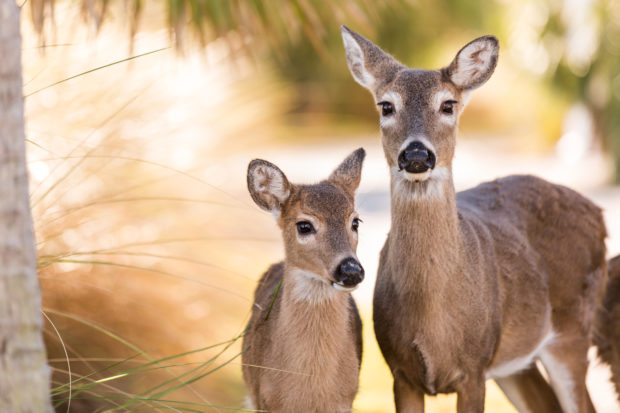
When used properly, PZP reduces fawning rates by 85 to 90 percent. Photo by Richard Ellis/For The HSUS
For years, when community residents became agitated about the presence of deer in their neighborhoods, government leaders and residents often defaulted to shooting or even killing the animals with arrows as a way to reduce their densities. Now, in a move that will help communities interested in considering a different and humane response to conflicts with wildlife, the Environmental Protection Agency has approved the registration of the immunocontraceptive vaccine, Zonastat- D, for the management of deer populations.
Similar to the Zonastat-H vaccine, whose use in the humane control of wild horse populations is well established and effective, Zonastat-D is the trade name for the porcine zona pellucida (PZP) vaccine, adapted for deer. PZP blocks fertilization by triggering the production of antibodies that bind to the protein envelope surrounding the egg.
Adding this vaccine to the management toolbox enables wildlife managers to reduce populations gradually, often without resorting to lethal methods. Sport hunting or sharpshooting management options are often considered unsafe, impractical, and unpalatable in many urban and suburban communities.
The HSUS has traveled a long road with its partners to reach this point. Field studies on deer that provided the foundation for this registration stretch back to 1993, when scientists from the Science and Conservation Center in Billings, Montana, and the University of Toledo joined HSUS staffers to administer the first PZP-filled darts to deer at Fire Island National Seashore in New York. Subsequent HSUS field studies at the National Institute of Standards and Technology – our neighbors in Gaithersburg, Maryland – and a collaboration with Tufts University at Fripp Island, South Carolina, provided more validation. These were experimental programs, and the authorization for the use of the vaccine had only been made at these select locations.
Having treated many hundreds of deer with PZP, HSUS scientists and other researchers who have experience with the vaccine have abundant evidence to demonstrate that it’s safe for the animals, doesn’t pass through the food chain, and is effective in reducing reproductive success. When used properly, PZP reduces fawning rates by 85 to 90 percent. The EPA’s approval of the vaccine affirms those conclusions, and I’m pleased to see this piece of good news for animals coming out of the Trump administration.
But there’s still work to be done. The HSUS will need to work with state wildlife agencies and legislatures to ensure that the use of PZP — where appropriate — is sanctioned. And now that Zonastat-D is federally registered, The HSUS is looking forward to working with communities whose residents want to embrace non-lethal programs and build comprehensive, humane solutions that will encourage all of us to better understand and celebrate our wild neighbors.
When it comes to 21st century wildlife management, we need more options than mass killing. PZP is one revolutionary option that can help remake our relationship with deer, wild horses, elephants, and other species where localized overabundance is a social and even an ecological concern.
P.S. If you’d like to learn more about non-lethal wildlife management, I recommend checking out the Botstiber Institute’s 8th International Conference on Wildlife Fertility Control, which The HSUS is co-hosting next week in Washington D.C. The use of fertility control for deer populations, as well as many other species, will be discussed by experts from around the world. Register here for the conference.
The post EPA gives thumbs up on vaccine to manage deer populations humanely appeared first on A Humane Nation.
Enviroshop is maintained by dedicated NetSys Interactive Inc. owners & employees who generously contribute their time to maintenance & editing, web design, custom programming, & website hosting for Enviroshop.
